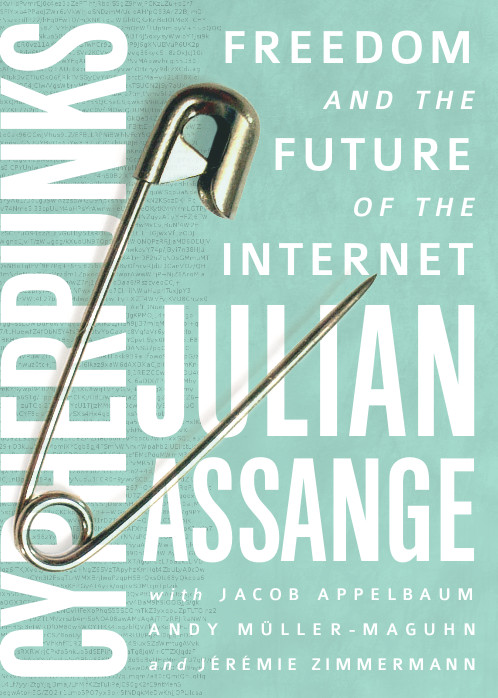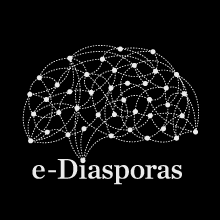Julian Assange, et al.: Cypherpunks: Freedom and the Future of the Internet (2012)
Filed under book | Tags: · activism, anonymity, censorship, code, cryptography, cypherpunk, encryption, free software, hacking, internet, internet activism, politics, privacy, software, surveillance, transparency, wikileaks

Cypherpunks are activists who advocate the widespread use of strong cryptography (writing in code) as a route to progressive change. Julian Assange, the editor-in-chief of and visionary behind WikiLeaks, has been a leading voice in the cypherpunk movement since its inception in the 1980s.
Now, in what is sure to be a wave-making new book, Assange brings together a small group of cutting-edge thinkers and activists from the front line of the battle for cyber-space to discuss whether electronic communications will emancipate or enslave us. Among the topics addressed are: Do Facebook and Google constitute “the greatest surveillance machine that ever existed,” perpetually tracking our location, our contacts and our lives? Far from being victims of that surveillance, are most of us willing collaborators? Are there legitimate forms of surveillance, for instance in relation to the “Four Horsemen of the Infopocalypse” (money laundering, drugs, terrorism and pornography)? And do we have the ability, through conscious action and technological savvy, to resist this tide and secure a world where freedom is something which the Internet helps bring about?
The harassment of WikiLeaks and other Internet activists, together with attempts to introduce anti-file sharing legislation such as SOPA and ACTA, indicate that the politics of the Internet have reached a crossroads. In one direction lies a future that guarantees, in the watchwords of the cypherpunks, “privacy for the weak and transparency for the powerful”; in the other lies an Internet that allows government and large corporations to discover ever more about internet users while hiding their own activities. Assange and his co-discussants unpick the complex issues surrounding this crucial choice with clarity and engaging enthusiasm.
With Jacob Appelbaum, Andy Müller-Maguhn, and Jérémie Zimmermann
Publisher OR Books, New York/London, November 2012
ISBN 9781939293008
192 pages
Interview with Assange where he also speaks about the book (video, DemocracyNow!, 29 November 2012)
Commentary (The Guardian)
Review (Cryptome.org)
PDF (PDF)
PDF (EPUB)
PDF (MOBI)
PDF (torrent, all 3 formats)
Video of Assange’s TV show The World Tomorrow interview the book is based on, Part 1, Part 2 (Youtube.com)
Dana Diminescu (ed.): Social Science Information journal, Special issue: Diasporas on the Web (2012)
Filed under journal | Tags: · colonialism, diaspora, egypt, france, india, internet, lebanon, macedonia, nepal, palestine, tamil, tunisia, virtual communities, web, yugoslavia

“One of the major changes affecting diasporas the world over since the 1980s has been the increasing number of communities scattered throughout physical space, along with new forms of presence, regrouping, interaction and mobilization within digital territories.
This change calls for a renewal in epistemological approaches. The topics under study, as well as the conceptual and methodological tools used to analyse them, need to be reconsidered in the face of this evolution of diasporas. The articles published in this issue of SSI1 bear witness to such an effort: researchers and engineers involved in the e-Diasporas Atlas project have sought to find the most appropriate concepts, tools and methods to explore the Web of diasporas, based on a number of case studies. This work represents a vast new area of investigation, which is still under way.
In this introduction, we examine the different conceptual tools used during the research, analyse their relevance for the different diasporic communities on the Web and present the methodological chain developed within the e-Diasporas Atlas project as well as the most important findings.” (from the Introduction)
With contributions by Dana Diminescu, Anat Ben-David, Yann Scioldo-Zürcher, Houda Asal, Marta Severo and Eleonora Zuolo, Teresa Graziano, Ingrid Therwath, Priya Kumar, Tristan Bruslé, Kristina Balalovska, Francesco Mazzucchelli
Social Science Information, December 2012; 51 (4)
Publisher: SAGE, on behalf of Maison des Sciences de l’Homme, Paris
ISSN 0539-0184
245 pages
via ach
e-Diasporas Atlas project page (includes working papers and interactive graph)
Comment (0)Michael Mandiberg (ed.): The Social Media Reader (2012)
Filed under book | Tags: · blogging, copyright, free culture, hacking, indymedia, internet, labour, memes, open source, peer production, phreaking, social media, social networks, wikipedia, youtube

With the rise of web 2.0 and social media platforms taking over vast tracts of territory on the internet, the media landscape has shifted drastically in the past 20 years, transforming previously stable relationships between media creators and consumers. The Social Media Reader is the first collection to address the collective transformation with pieces on social media, peer production, copyright politics, and other aspects of contemporary internet culture from all the major thinkers in the field.
Culling a broad range and incorporating different styles of scholarship from foundational pieces and published articles to unpublished pieces, journalistic accounts, personal narratives from blogs, and whitepapers, The Social Media Reader promises to be an essential text, with contributions from Lawrence Lessig, Henry Jenkins, Clay Shirky, Tim O’Reilly, Chris Anderson, Yochai Benkler, danah boyd, and Fred von Loehmann, to name a few. It covers a wide-ranging topical terrain, much like the internet itself, with particular emphasis on collaboration and sharing, the politics of social media and social networking, Free Culture and copyright politics, and labor and ownership. Theorizing new models of collaboration, identity, commerce, copyright, ownership, and labor, these essays outline possibilities for cultural democracy that arise when the formerly passive audience becomes active cultural creators, while warning of the dystopian potential of new forms of surveillance and control.
Publisher NYU Press, 2012
Creative Commons Attribution NonCommercial ShareAlike (CC BY-NC-SA) license
ISBN 0814763022, 9780814763025
289 pages

